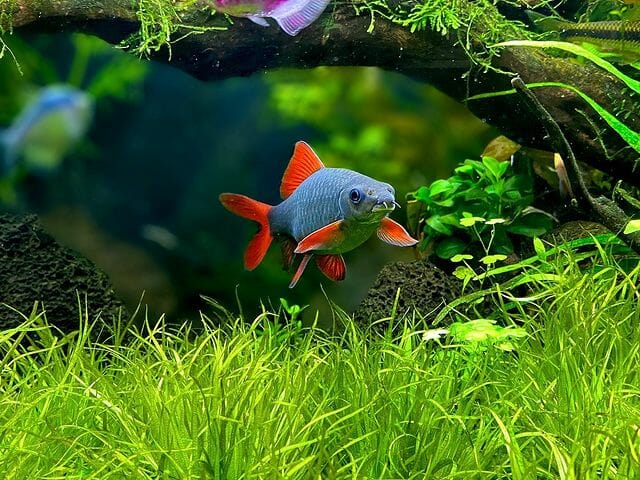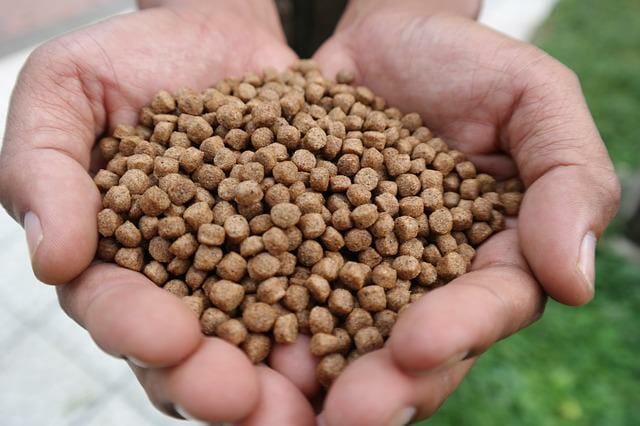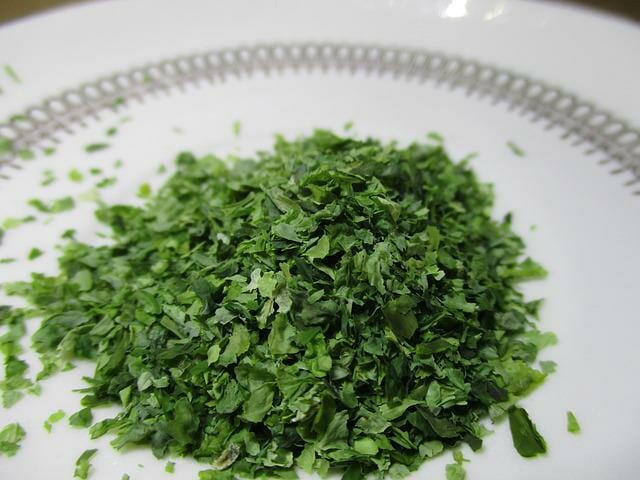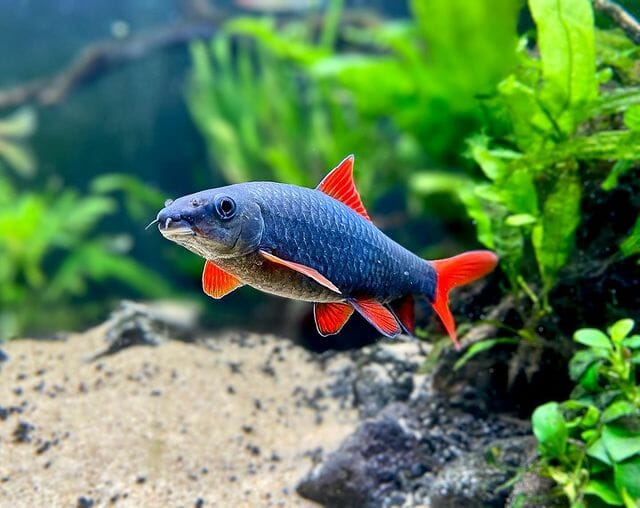What to Feed Rainbow Sharks: List of Good & Bad Food, Feeding Schedule, and Instructions

Rainbow sharks should eat small prey such as juvenile fish or smaller crustaceans and live foods, such as insect larvae and tubifex worms.
Table of Contents
What Do Rainbow Sharks Eat in the Wild?
Rainbow sharks live in tropical and subtropical waters around the world. They eat juvenile fish, smaller crustaceans, and insects in the wild.
What Do Rainbow Sharks Eat in Captivity?
Rainbow sharks are fed a diet of small fish, crustaceans, and other aquatic creatures in captivity.
Plus, they may also be given live food. So, in captivity, rainbow sharks eat a variety of things. Additionally, some aquarists feed rainbow sharks a diet of fresh fruit and vegetables.
The Suitable Diet for Rainbow Sharks in a Fish Tank
In an aquarium, rainbow sharks should be fed a diet of commercially available fish foods and smaller prey. Live food can also be offered, such as insects or larvae. Like any pet fish, regularly clean their water and tank to remove waste and provide fresh water.
So, as with all aquarium fish, it is essential to research the specific dietary needs of your rainbow shark before setting out to purchase food.
In addition, it is also a good idea to change the diet regularly and to supplement it with fresh food if necessary. Additionally, please provide them with a hiding place and plenty of swimming space.
Sinking Pellets or Flakes
The staple diet of most rainbow sharks in captivity is sinking pellets or flakes. These are composed of small fish and crustaceans that have been ground down and milled into tiny pieces, making them easy to feed.

Vegetables
In addition to sinking pellets or flakes, some aquarists also offer rainbow sharks a diet of fresh vegetables. These can be chopped into small pieces and added to their aquarium as part of their regular food supply. In addition, vegetables can also be offered as a treat.
Frozen Food
Some aquarists also offer rainbow sharks frozen food as part of their regular diet. This can be fish, shrimp, or other small prey that has been thawed and cooked. Frozen food is a good option for those with limited access to fresh fruit and vegetables.
So, selecting freeze-dried food with high levels of vitamins, minerals, and other essential nutrients is essential.
Live Food
Some aquarists also supplement their rainbow shark’s diet with live food. These can be small fish, crustaceans, or other aquatic creatures that have been captivity-raised and are therefore safe for the sharks to eat.
Live food is an integral part of a balanced diet for any carnivore, but it is especially crucial for rainbow sharks. These predators target and consume live prey as their primary source of nutrition. In addition, make sure the food is fresh and cleaned adequately before feeding it to your rainbow shark.
Algae
Some aquarists also offer their rainbow sharks a diet of algae. This can be consumed as part of their regular food supply or added to their aquarium as a supplementary source of nutrition. Algae is high in protein and other essential nutrients, making it an ideal supplement for marine animals such as rainbow sharks.
In addition, algae can also be used as a substrate for growing colonies of aquarium dinoflagellates. These creatures are essential in the maintenance of healthy coral reefs.

Brine Shrimp
Another option for feeding a rainbow shark is brine shrimp. These freshwater creatures are high in protein and other nutrients, making them an ideal food source for predators such as rainbow sharks.
Just select the correct type of brine shrimp to feed your shark. Avoid those that have been contaminated with toxins or pollutants, as these can be harmful to your predator’s health.
Foods You Shouldn’t Give Your Rainbow Shark
Some items that should be avoided when feeding a rainbow shark include dried fruit, sweets, greasy foods, and meaty items. These can be unhealthy for the animal and lead to dietary problems later in life.
This is because these predators can be susceptible to parasites and other harmful bacteria that may be present in such foods.
Instead, they usually feed their sharks various healthy fishmeal-based diets or algae supplements. These diets are high in protein and other essential nutrients and make an ideal supplement for your shark’s regular diet.
How Often Should I Feed Rainbow Shark?
Feeding your rainbow shark regularly is essential for their overall health and wellbeing. Select the correct type of food to meet their specific dietary needs.
Additionally, feed your shark fresh or frozen foods whenever possible, as these will be more pleasing to their taste and nutrition-wise. Hence, feeding a rainbow shark should not be difficult, but doing it regularly will ensure their long-term health and wellbeing.
How to Feed Your Rainbow Shark Properly
1. Choose the correct type of food:
The first step is selecting the correct food type for your rainbow shark. This will depend on their specific dietary needs, so be sure to consult a veterinarian or pet store if you’re not sure what would be best for your fish.
2. Feed fresh or frozen foods:
Feeding your shark fresh or frozen foods is always preferable, as they are more nutritious and satisfying. Additionally, freezing can preserve nutrients and make them last longer in storage.
3. Monitor their weight and health:
Since rainbow sharks are predators, they need a good balance of protein and other essential nutrients in their food. Monitor their weight, as low body weight may indicate that they are not getting the proper nutrition.
If you notice any changes in your shark’s behavior or appearance, it is best to consult with a veterinarian immediately.

How Long Can Rainbow Shark Survive Without Food?
Rainbow sharks can survive for up to three days without food, provided they have access to water. However, they will eventually become weak and succumb to dehydration if left unassisted.
So, always provide your shark with fresh food and water regularly. Additionally, ensure to keep an eye on their weight and health, as low body weight or signs of illness may indicate that they are not getting the proper nutrition.